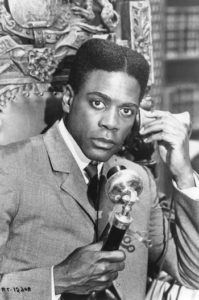
Howard Rollins Jr.
Howard Rollins Jr. was born on this date in 1950. He was a Black actor.
Born in Baltimore, Howard Ellsworth Rollins, Jr., was the youngest of four children born to Howard E. Rollins, Sr., a steelworker, and Ruth R. Rollins, a domestic worker. After high school, he attended Towson State College, MD, where he studied theater. In his early years, Rollins vaguely considered becoming a teacher. At 17, a friend convinced him to attend a casting call at a local Baltimore theater, where he won a role in "Of Mice and Men."
Rollins surprised himself with his talent. In 1981, he told the New York Times, "Things made sense to me for the first time in my life." In 1974, he moved to New York City to start his career.
The big break for Rollins came when director Milos Forman cast him as Coalhouse Walker, Jr., in the 1981 film "Ragtime," based on the best-selling novel by E.L. Doctorow. Set at the beginning of the twentieth century, "Ragtime" includes a powerful storyline about a talented Black pianist who is the victim of racism, demands justice from the legal system, receives none, and ultimately desperately turns to retaliation. Rollins won wide acclaim for this portrayal and ultimately was nominated for an Academy Award for Best Supporting Actor in 1981.
In 1982, speaking to the Los Angeles Herald-Examiner about the treatment of racism in "Ragtime," Rollins stated: "It's as valid today as it ever was. You have neo-Nazis resurging; you have the Klan attempting to resurrect its members. There's no huge difference between 1906 and 1982 if one really looks at it. That movie could be done today and called 'Nowtime.'"
Rollins' performance in "Ragtime" led to many film and television roles. In 1982, he was nominated for an Emmy Award for Best Supporting Actor for his work in the daytime serial "Another World." He also appeared in a TV production of Carson McCullers' "The Member of the Wedding," in the comedy series "Fridays," and as the late civil rights leader Medgar Evers in "For Us the Living: The Medgar Evers Story."
In 1984, he played the lead role of Captain Richard Davenport in "A Soldier's Story," a film drawn on the Pulitzer Prize-winning play written by Charles Fuller and initially produced in New York City in 1981 by the famed Negro Ensemble Company. Rollins starred as an Army lawyer sent from Washington, D.C., to investigate the murder of an African American sergeant on a military base in the South. This murder may have been committed by Ku Klux Klan members from the area. Captain Davenport's investigation takes a surprising turn, and the results demonstrate the pernicious impact of racism on African Americans.
Beginning in 1988, Rollins starred with Carroll O'Connor in the TV series, "In the Heat of the Night," which was drawn on the 1967 film starring Sidney Poitier and Rod Steiger. The series was first shot in a small town in Louisiana and then in a small town in Georgia. Although Rollins had grown up in Baltimore, he often felt uneasy and isolated in the Deep South. He frequently said derogatory words about blacks were used when he left the set.
He did not find the environment welcoming or friendly; he found the work on the series to be formulaic, and he began to indulge in cocaine and alcohol. In 1988, while filming in Louisiana, he was arrested for possession of cocaine. Despite efforts at rehab, his problems continued, and in the early 1990s, he served a 70-day jail sentence in Georgia for driving under the influence. Despite Carroll O'Connor's continued friendship and loyalty, Rollins was eventually written out of "In the Heat of the Night."
In his last years, Rollins made determined efforts to rebuild his career. He appeared in the TV series New York Undercover and Remember WENN, the PBS television film Harambee, and the theatrical film Drunks. Rollins' exceptional acting throughout his career helped to inspire generations of Black actors, playwrights, and filmmakers. Despite his troubles, he was cherished by his friends inside and outside the entertainment industry.
Howard Rollins died on December 8, 1996, of complications from lymphoma. He was 46 years old. On October 26, 2006, a statue of Rollins was unveiled in his native Baltimore at the Senator Theater. This statue is now part of the collection of the National Great Blacks in Wax Museum in Baltimore.
Bob Lamm, interview with Howard Rollins,
Los Angeles Herald Examiner,
Dec. 18, 1982, p D2.